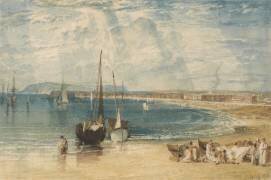Customise
Your art print
The Wanderer above the Sea of Fog OF Caspar David Friedrich
The Wanderer above the Sea of Fog
The Wanderer Above the Sea of Fogs: masterpiece by Caspar David Friedrich
One of the most emblematic paintings of German Romanticism is undoubtedly The Wanderer Above the Sea of Fogs, painted by Caspar David Friedrich in 1818. This fascinating work captivates the viewer with its beauty and mysterious symbolism.
History of the work The Wanderer Above the Sea of Fogs
Considered one of the most important painters of the German Romantic movement, Caspar David Friedrich was born in 1774 in Greifswald, northern Germany, and studied at the Royal Academy of Fine Arts in Copenhagen.
Friedrich was an introverted and contemplative artist, which is reflected in his favorite themes. He focused on dramatic landscapes representing nature in all its beauty and power.
In this context, in1818 he created The Wanderer Above the Sea of Fogs, also known as Der Wanderer über dem Nebelmeer in German. Yet this iconic oil painting was produced on a modest canvas, measuring 94.8 x 74.8 centimeters.
Visual description of The Wanderer Above the Sea of Fogs
The painting depicts a solitary man, dressed in a long dark frock coat, wearing a hat and carrying a walking stick, standing atop a steep cliff. With his back to the viewer, he contemplates a breathtaking landscape: a vast expanse of mist and clouds, pierced here and there by the relief of the mountains.
Contrasts of light and shadow lend the scene a dramatic, intense atmosphere. The sky is laden with wispy streaks. Dark, gray tones predominate in this horizon colors evocative of solitude and inner contemplation.
The focal point of the painting is undoubtedly the traveler himself, who almost seems to merge with his surroundings thanks to the similar shades of his clothing and the surrounding rock. He thus perfectly embodies the romantic idea of communion between human beings and sublime nature.
Symbols behind the image of the traveler
The figure of the traveler is essential to understanding the symbolic significance of this work. He can be interpreted as a character in search of escape and freedom, in the image of the painter himself. The solitary man seems to seek existential answers in the vast natural expanses stretching out before him.
Some even consider that this character could be a representation of the artist Caspar David Friedrich.
Influence of The Wanderer Above the Sea of Fogs on the Romantic movement
Although Friedrich's fame declined somewhat towards the end of his life, his influence on his contemporaries and the Romantic movement in general is undeniable. His elegiac landscapes laid the foundations for a new artistic genre celebrating the interrelation between man and nature. Along with his German contemporaries such as Philipp Otto Runge and Carl Gustav Carus, Friedrich played a decisive role in promoting landscape art as a poetic and spiritual means of expression.
This artwork is a painting from the classical period. It belongs to the romanticism style.
« The Wanderer above the Sea of Fog » is kept at Hamburger Kunsthalle, Hamburg, Germany.



































